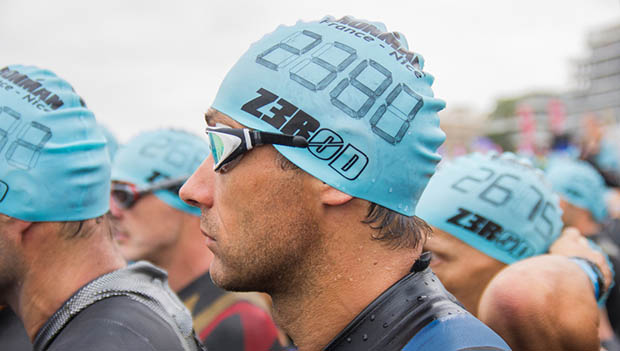
An IRONMAN is no easy feat. To a nonathlete, combining a 2.4-mile swim, 112-mile bike ride and 26.2-mile run in a single-day event is almost inconceivable. But whether it's through seeing the images of the Big Island during the NBC IRONMAN World Championship coverage or being an athlete looking to up your game, IRONMAN has captured the attention of competitors for over 40 years.
In its simplest form, an IRONMAN is just a long distance triathlon. However, ask anyone who's ever completed one, and they'll tell you there's more to racing 140.6 miles than meets the eye. Preparing for an IRONMAN is time consuming, expensive and exhausting, but there's perhaps nothing more rewarding than hearing "YOU ARE AN IRONMAN" as you cross the finish line.
From registering to racing and everything in between, here's a basic overview of what you can expect (and some questions to ask yourself) during your first IRONMAN experience.
What do you want to achieve?
Everyone completes an IRONMAN for their own reasons. For some, simply surviving the swim and finishing within the 17-hour cutoff is a win. Others might be attempting to PR, win their age group or qualify for Kona. Be realistic with your goals, both for race day and while training. IRONMAN is a tough day no matter how you look at it, so first timers should set realistic, obtainable goals to limit any unnecessary pressure.Which IRONMAN should you choose?
All standard IRONMAN races are 140.6 miles, but this doesn't mean all are created equally. There is a big difference between racing at IRONMAN Canada versus racing IRONMAN Cozumel. Look back at your past successes and failures to determine what climate and time of year works best for your racing style. Also, do you prefer hill or flat courses? Do you like ocean or lake swims? Do you like traveling to races or is something closer more appealing? Do you have any scheduling conflicts with family or work? How long of a training runway do you need? A little planning can make a huge difference come race day.How much are you willing to spend?
This includes both the budget for the gear and training requirements and the budget for traveling to and from your destination. Remember, the registration fee is significant to start, and it's quickly followed by things like the cost of a gym membership, a bike (or a tune-up), new gear, performance nutrition, recovery aids and more. Before you commit, determine how much you're realistically willing to spend and parcel out funds from there—not everyone needs to blow $10,000 on an aero triathlon bike to complete an IRONMAN. Contrary to popular belief, an IRONMAN can be done on a budget.What should you expect on the swim?
The swim is easily the most daunting phase of the race for first timers. When thousands of athletes are out on the course at the same time, it's not uncommon to feel overwhelmed and a bit disjointed. The key (like with the other two legs) is to race at your own pace—don't try to keep up with the swimmer next to you or go out harder than you trained for. Also, be warned that you'll likely be touching nearby swimmers as you progress through the course, sometimes even getting unintentionally kicked or hit (usually around the buoys). It's just part of racing, so know it's okay to pull off to the side to take a breather and float it out for a bit if needed.What should you expect during the transitions?
There's no sugarcoating it—transitions are a hectic experience. There will be hundreds of athletes in the changing tent at the same time with volunteers running around to help as needed. The best way to keep your peace of mind is to take a deep breath, stay organized and don't go too fast. Keep a mental checklist of gear or clothing you need to shed and what gear and clothing you need on the next leg. Remember your nutrition, as well as sunscreen and other consumables, before you head out.What should you expect on the bike?
Once you're out of the water, the relief combined with the thousands of spectators cheering you on means it's all-too-easy to get excited and overexert yourself. Focusing on pace and nutrition is key; be aware of your energy levels and adjust your nutrition accordingly. Many first timers only complete 100-mile bike rides as part of their training plan, so be aware the extra 12 miles really do add up in the end. Don't forget—you still have a marathon to run.What should you expect on the run?
You've completed the swim and the bike, and all that's left is the marathon. Like shorter triathlon distances, expect your legs to feel sluggish and heavy during the first few miles after the bike leg. Know this feeling will typically subside when you get warmed up, but once you start feeling better, it's important to not overdo it early on. A marathon is a long distance to cover without having done a 2.4-mile swim and 112-mile bike beforehand.Continuing your nutrition and hydration is key here as well, and most IRONMAN races have aid stations every mile that offer snacks like chips and pretzels, as well as gels and chews. Pro tip: Take advantage of the warm chicken broth offered after dark.
What should you expect after the race?
There's nothing like crossing the finish line at your first IRONMAN. Don't worry about your Garmin data or heading back to the hotel—enjoy the sights and sounds in the finishing chute as you find your family and friends in the crowd. The joy at the finish line is contagious, with athletes celebrating after battling through the hardships of the day to complete their dream of becoming an IRONMAN. It's emotional, it's raw and it's something to savor. The midnight hour is especially inspiring—athletes and spectators return to cheer on the final few athletes as they attempt to cross the finish line before the 17-hour cutoff.After enjoying the finish line festivities, continue hydrating and replenishing the calories you lost throughout the day (completing an IRONMAN can burn over 10,000 calories!). Gather your family and friends, find a local restaurant and indulge in a celebratory cheat meal or two—you deserve it!
READ THIS NEXT: The 4 Rules of IRONMAN Training








Discuss This Article